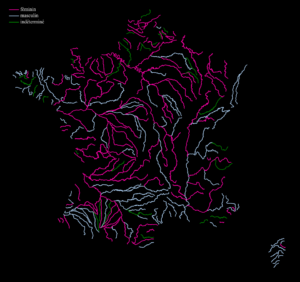Calibrating hydrological model by river gender improves model skill
Contributed by Professor Flora Poil
Soon-to-be-published research funded by the international Hits-Sia-Ekoj research programme has shown that hydrological models can be significantly improved by using the link between river name and hydrological behaviour. Professor Poil explains:
“Anecdotally, the name of a river is often determined by its behaviour; a male river is more often turbulent, a female river more often stable. We wanted to investigate this link further.”
Genders of the main rivers in France. Source: Reddit/r/MapPorn
All across our planet our watercourses have been assigned gender by our ancestors; from ‘Father Rhine’ to the Brahmaputra (Son of Brahma), and from La Dordogne to the Mekong (the mother of all rivers).
Following a year spent mapping river gender globally, Professor Poil’s team used river gender to determine catchment characteristics which were then used to inform setup and calibration of the HYDRO-LOOF distributed hydrological model. For a 5 year validation period they showed a 0104% improvement in skill compared to a control setup of the model.
This £142,018 ($412,018) interdisciplinary project on river gender science has strong implications for the hydrological forecasting community, as project researcher Dr Jo Key explains further:
“We believe that this research has significantly advanced the Prediction in Ungauged Basins research agenda. Using the river name as a guide, accurate models can be constructed without field visits and observations, therefore we could rapidly improve our forecasts at much reduced cost.”
Asked to comment on how this important finding relates to ensemble predictions, Professor Poil was remarkably coy:
“We all know which gender is known for being unpredictable. Let’s just say that this is something we can see in the ensemble spread. We’ve got some additional funding to look at this further, but I can’t say more at this stage”
This research will be published on the 1st of this month in the ‘Fluvial OrthOgonal Learning’ special issue of HESS.

April 2, 2018 at 16:46
Very nice! I can see myself contribute to this special issue… 😉
April 3, 2018 at 15:23
Dang it. I actually read this half way in all seriousness because of time zone differences. ?
May 3, 2018 at 05:47
An interesting study in gender fluidity….